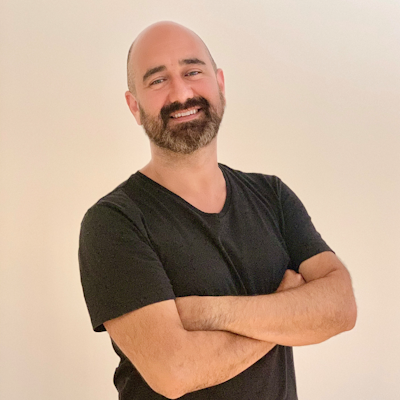
Communicating Through Gestures: An Interview with Germán León
NTT DATA: Hello, Germán. Welcome and thank you very much for joining us in the Startup Radar Podcast. So Gestoos original offer was targeted at the digital and consumer electronics sectors. Which opportunities did you see in the automotive industry to deploy your technology within it?
Germán León: When we talked about the automotive industry, we realized that we have what we call a very powerful tool to detect any human in a vehicle and understand any behaviour, any gesture, or any shape. Also, we realized that in automotive, particularly with gesture recognition, we had an option; people were interested in acquiring the technology and, because there’s already the concept of ADAS, we didn’t have to fight it, which was completely different for retailers.
NTT DATA: And then, how does your technology differ from one sector to the other? Which implementations of your technology could you tell us about?
Germán León: Let’s start with the premise that ultimately what we are building, in terms of technology, is a semi-human. The concept is called “multimodal experience”, which means using all sorts of natural touch, voice, and gesture interfaces combined, just like a human being. I mean, we are building experiences, which help us to kind of merge different technologies together to create that true understanding. We are working in helping car fleets, companies that have fleets, to improve the safety of the driver and the passengers, and to allow these fleets to be operational at all times.
Our main customers are car fleets, and they use this, in combination with the insurance companies, to lower the premiums of the insurance, to provide a better service. Our Anomalous Detection Assistance Modality software (ADAM) is basically like a live guardian angel that is on the car fleets to support the user, help the company to keep the car operational, and provide eyes for them to see and understand what is happening with each vehicle at all times.
NTT DATA: In this sense, have you considered collaborating with the insurance sector? Do you think your technology could help provide a driver risk score?
Germán León: I think insurance companies would be ideal partners for us. We’re just not set up to work with insurance companies because we are not the end product, we are just one part of the puzzle.
We need to work through companies like NTT DATA that can complete the ecosystem because you understand what the product that they need to do was.
The reason why insurers are important for us is that, when you have the data or how this person is behaving or how this person is, for instance, driving or what activity that person’s doing, you can tailor that insurance to give a better proposition to that consumer. Insurance companies would benefit a lot from having computer vision technologies allowing them to score drivers, to have on-the-spot, real-time, accident information, to provide support services around, not only accidents, but preventing them and, many different anomalies that could happen when you’re in this space.
And you don’t have to wait for the autonomous car to come into play; you can do that today with the car-sharing companies or companies that have fleets because if you have a smart insurer that can see and understand what is happening with the driver and the passengers, you can do a “Pay As You Go”. And ultimately that means better service and better service means more business.
I’m very optimistic that the autonomous industry will eventually happen, it’s just going to take some time.
NTT DATA: This idea of “humanizing technology” delivers huge amounts of data. How do you collect and store these data and what do you do with them?
Germán León: Data strategy is the key point for the winning company. What we do is that we use synthetic data and other mechanisms to create that unique experience, with low data quantities.
When it comes to the privacy of this data, it’s anonymized, so we only need to keep the metadata of the vectors of the movement of the people, and that knowledge is what is kept. In this sense, it allows, from a GDPR point of view, the users to have their data, access it, and erase it if they want to, but from a knowledge point, we keep the algorithm and we keep all the information around. And that’s the key aspect. We do not plan to sell the data, we plan to sell the knowledge, that’s our business model.
NTT DATA: We love touching things, papers, food, materials, and especially screens, but with Gestoos we’re avoiding this kind of essential human sense. Do you think it is an entry barrier for the users just to base our interaction on gestures?
Germán León: When it comes to active interaction, it is something completely new. These are learned behaviours. Touchscreens have existed for many years, but before the iPhone, there was no such large adoption of using this technology. So, gesture technology is something that we will learn and it will come.
What we need to find is that specific interaction or that specific vehicle that gives the right level of robustness and also experience for people to adopt it. And that’s our mission, that’s basically what we want to do. When it comes to passive interaction, that’s completely different, because it is about us understanding humans and so in that sense, it’s about how we respond, and that second step is much more intuitive because you start to see that things are responding to you and that has no entry barrier.
So those are the two challenges: in active interaction, it’s about teaching people how to interact with gestures; in passive interaction, it’s kind of like “wow, this space gets me, this car understands what’s going on, it’s helping me”. And specifically, now with COVID-19, we believe that people are starting to understand that distancing and not touching services is important and they almost expect a new type of interaction beyond touch.
NTT DATA: So, let’s move forward to the autonomous cars section. It is something still very raw. Do you think there’s still this resistance to autonomous cars as a new way of mobility?
Germán León: Yes, of course. There are two aspects to this answer: one is from a technical standpoint and the second is from a policy and social point of view. The first one is about technology and maturity; autonomous driving and autonomous vehicles require a lot of data, and they are biased, so they will only learn the data that they generate while driving this is a process that has a timeline, and we’ll get there, eventually.
The second area is trickier because is about all the people that work in the mobility space: bus drivers, taxi drivers, and everyone that is in this area, which is a huge amount of people, will have no jobs. And for that, governments require to do more policies, and companies that will be operating fleets of these vehicles will require to recycle this amount of folks that will probably be without jobs.
So, these two events are starting to collide, and I believe some companies are preparing themselves for this. Some also, car companies, will see a huge impact because they will not be selling cars the typical way they are doing today and they are going to have the majority of sales to fleet owners. The customer journey of the mobility experience is evolving and is changing and so the concept of ownership will change and that will impact business models. So, that’s what I believe what’s the problem right now: there are a lot of legacies.
We have car dealerships selling vehicles, we have a lot of taxi drivers, we have a lot of bus drivers, we have unions, and we have different elements that are kind of stopping that adoption to happen much faster. But it’ll happen ultimately because, it’s better for the environment, it’s better for the world, and ultimately people will find a solution. I’m very optimistic that the autonomous industry will eventually happen, it’s just going to take some time.
NTT DATA: Do you think that also other companies, even the market, are ready for it? How do you see it’s going to evolve the consumption of this technology?
Germán León: I think the key question is user adoption. The expectation from users is extremely high and because of that expectation, adoption is tricky, people are not willing to go through the process of these technologies evolving to that level of robustness. So that’s going to take time. The beginning will have early adopters, primarily in the audio space, using audio technologies, and voice technologies, to interact with different devices. Now we’ve seen the introduction of gesture technology particularly in the virtual reality space, and with some nuances in the automotive with BMW series 7 cars which have just a control. Slowly we will see that that adoption is coming, users will start using this technology, and that’s ultimately what’s going to drive the fundamental economics behind us, companies developing and building these technologies, to do that and also to add services around it.
NTT DATA: How is Gestoo’s technology implicated within AV solutions?
Germán León: Huge. It’s one of the areas where we are working closely with a lot of OEMs, and this is the reason mainly we got funded. Why is this so critical?
The first thing is that the model of interaction in the car will change completely. In an autonomous vehicle, you will always have to be strapped in the car because you will have, you’re still moving from A to B in a, you know, reasonable speed, and then you cannot always be touching different elements. You need to start using voice interactions and gesture interactions to interact with your HMI, the human-machine interface of the vehicle. The second aspect is, within the mobility space, having smart computer vision technology, allows us to see and understand before, during, and after any anomalous event.
Now we have a very smart AI that can see when that accident happens and helps you immediately. So, the entire journey of the mobility experience has different touchpoints but all of them require smart vision, they all require something or someone that sees and understands what’s going on in every specific use case. We’re part of that, we’re big, and we’re working hard to complete these future scenarios.
NTT DATA: Which would you say are the biggest challenges concerning your technology and the whole Smart Mobility ecosystem?
Germán León: We have three main challenges. The first one, we call “Time to Revenues”. As a start-up, we depend on obviously having some traction, but we need money. So, for us to be able to get the money, we need to be funded for a long period while these technologies get embedded and supported.
The second challenge is from a technology standpoint; we need to be able to embed our software in a very low-cost camera that can be distributed in hundreds of thousands of vehicles around the world. The third thing is adoption and primarily in the car, in the mobility space, what we see problematic has always been privacy. People are still afraid of having a camera to see them at all times. So, this is why we have the concept of “Privacy by Design”, and this is why we anonymize all the data that comes out of that video stream so that no one’s able to hack it. But that’s going to take some time for users to get educated about what “Privacy by Design” means and also for users to feel comfortable about using or having cameras at all times.
NTT DATA: It is said, though, that turning these challenges into new opportunities is important. How do you think this revolution will open a door for new business models?
Germán León: With many business models, the possibilities are endless. The cars and vehicles will become canvases of new businesses and new opportunities. So, not only about paying for moving from A to B, but it’s also about paying for the experiences that happen in there. Everything can be done with technology in that vehicle. And you can solve tons of problems with that, you can change many models, and you can improve experiences in a way we have not even imagined. And it’s good for the environment, first of all, because you would have a more optimized way of moving from A to B, it’s good for the economy because it’s going to create a flourish of different types of businesses that we can’t even foresee that they exist and it’s also great for humanity in general because it’s allowing us to be more flexible. Less ownership means better services and it means more variety. That’s what changes.
NTT DATA: Has Gestoos joined other start-ups, enterprises, or even TechGiants? Have you thought of becoming a sales channel?
Germán León: It’s always super important to collaborate but we want to be a tech giant so one day we can hopefully power a lot of other businesses. TechGiants will try to do that by themselves, they will try to be leaders in this space, but because it’s about speeding up these technologies, it’s about robustness, it’s about getting the right experience and that’s already a process that we hope to be first.
As a data enabler, or as a data producer company, there could be things that might be interesting for different industries. We get to see what the things they like or dislike and there’s a certain appetite within the advertising industry to cater to those needs and offer specific advertising to those things. It’s something small and niche at the moment, but this is growing into an interesting service for the future. We don’t want to sell people’s data, that’s not the point. What we want to do is to improve their lives and if we can be that channel and do it correctly and ethically, we’re happy to do that.
NTT DATA: Finally, let’s talk about the future. Do you have plans of moving into other industries? Which projects are in sight for Gestoos?
Germán León: At the moment, we have been focusing on autonomous vehicles. The car industry is the biggest part of our work. We also have a smaller piece of the pie in what we call retail and physical spaces, but we see a great opportunity in terms of industrial setups. And now with COVID, we see the whole hygienic space expanding so eventually we will get to the health space and other areas, once we have the capability. From a technological standpoint, we’re ready; it’s more about, we’re not having enough folks to tackle all the different markets so we need to keep focused. But the answer is yes and in the future.
Header photo by Annie Spratt on Unsplash
Subscribe to Our Newsletter
Get the latest insights about Global solutions for leading insurers on your email



